Chapter 9: Directors
Chapter learning objectives
Upon completion of this chapter you will be able to:
- explain the role of directors in the operation of the company
- discuss the ways in which the directors are appointed, can lose their office or be subject to a disqualification order
- distinguish between the powers of the board of directors, the managing director and individual directors to bind the company
- explain the duties that directors owe to their companies
- demonstrate an understanding of the way in which statute law has attempted to control directors.
1 Directors
Definition of director
The term 'director' includes 'any person occupying the position of director, by whatever name called': s250 CA06.
The decision as to whether someone is a director is therefore based on their function not their title.
There must be at least one director who is a 'natural person'. In addition, a director must normally be aged at least 16.
De Jure Director
A person who is formally and legally appointed or elected asdirector in accordance with the articles of association and giveswritten consent to hold the office of a director.
De Facto Director
A person who is not a de jure director but performs the acts or duties of a director.
Any person, who is not technically a director, but according towhose directions and instructions other directors and employees areaccustomed to act, is legally deemed a de facto director.
A de facto director owes the same duties to the company as a dejure director, i.e. he is subject to both statutory duties andprohibitions, and he also owes fiduciary duties to the company.
Types of director
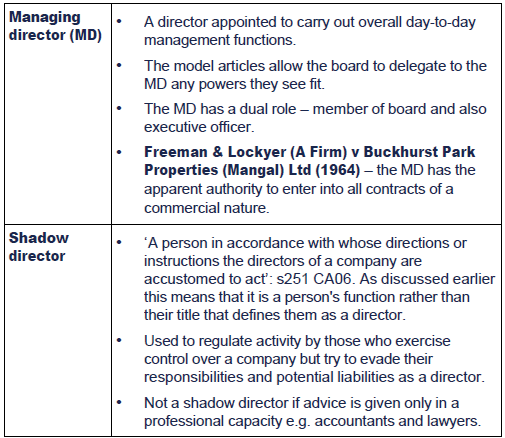

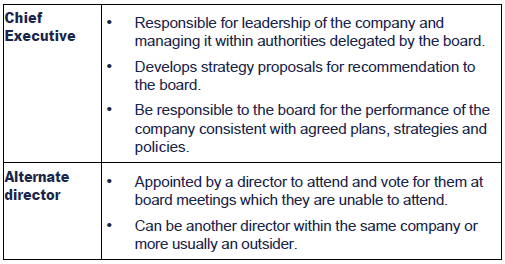
2 Appointment, disqualification and removal
Appointment
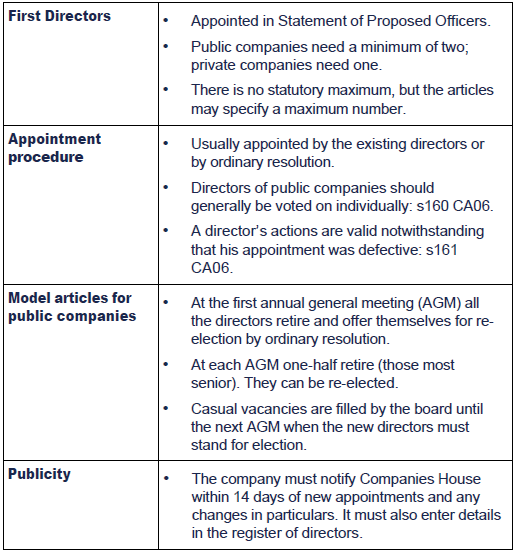
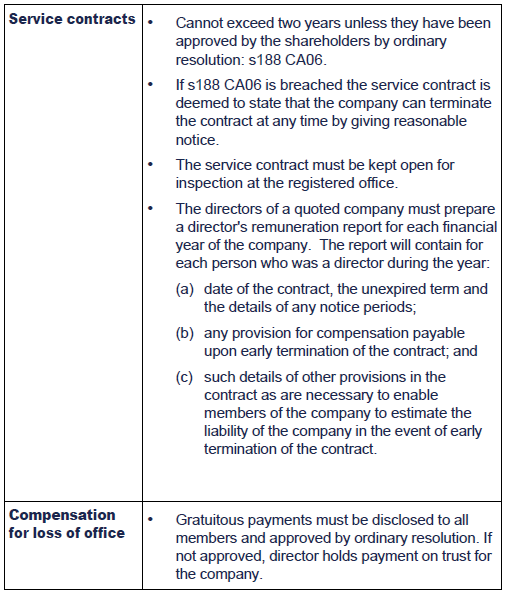
Disqualification
Model articles – Directors must vacate their office if they become bankrupt or insane
Company Directors (Disqualification) Act 1986(CDDA 1986)
The CDDA 1986 was introduced to prevent the misuse of the limitedliability status of companies by directors who would set up a newcompany to carry on essentially the same business as an old companywhich had ceased trading with unpaid debts.
A disqualified director cannot be concerned in the management of acompany directly or indirectly or act as a liquidator, receiver orpromoter.
The CDDA 1986 identifies three distinct categories of conduct:
(1)General misconduct in connection with companies. This includes:
- Conviction of a serious offence in connection with the management of a company (maximum fifteen years disqualification).
- Persistent breaches of CA06, e.g. failure to file returns (maximum five years disqualification).
(2)Disqualification for unfitness. This includes:
- Where an investigation by the Department for Business, Innovation and Skills finds the director unfit to be concerned in the management of the company.
- Where a liquidator's report finds the director unfit to be concerned in the management of a company (minimum two years and maximum fifteen years disqualification).
(3)Other cases for disqualification. This includes:
- Participation in fraudulent or wrongful trading (maximum 15 years disqualification).
- Where an undischarged bankrupt has been acting as a director.
Breach of a disqualification order:
- This is a criminal offence, which could result in a fine and imprisonment.
- The disqualified director (or any person who acts on his instructions) is personally liable for the debts of the company while so acting.
Removal
Under s168 CA06, a company may by ordinary resolution remove adirector before expiration of his period of office notwithstandinganything in:
- its articles, or
- any agreement between him and it.
Thus a director can be removed despite any provision to thecontrary in his service contract, although he can sue for damages if theremoval is in breach of his contract.
The company must follow this procedure to remove a director:
The power of the members to remove a director may be limited:
Bushell v Faith (1970)


 Test your understanding 1
Test your understanding 1
Which of the following states the requirements for removal of a director?
ASpecial resolution with ordinary notice
BOrdinary resolution with special notice
COrdinary resolution with ordinary notice
DSpecial resolution with special notice

3 Duties
General duties
Prior to the Companies Act 2006, common law rules, equitableprinciples and fiduciary duties made up the law on directors' duties. Afiduciary duty is a duty imposed upon certain persons because of theposition of trust and confidence that they are in.
These have now been replaced by the specific statutory dutiesprovided in the Companies Act 2006 (s170). However, the old case lawstill has relevance in interpreting the new legislation and illustratingits application.
Duty to act within powers: s171
A director must act in accordance with the company's constitutionand only use his powers for the purpose which they were given. They havea fiduciary duty to the company to exercise their powers bona fide inwhat they honestly consider to be the interests of the company
If this rule is not adhered to the transaction will be void, unless it is approved by the shareholders.
Hogg v Cramphorn (1967)

Duty to promote the success of the company: s172
A director must act in good faith, in a way which promotes thesuccess of the company and for the benefit of the members as a whole.
The Act requires the directors to have regard to:
- the likely consequences of any decision in the long term
- the interests of the company's employees
- the need to foster the company's business relationships with suppliers, customers and others
- the impact of the company's operations on the community and the environment
- the desirability of the company maintaining a reputation for high standards of business conduct and
- the need to act fairly as between members of the company.
Companies may have wider purposes than just the benefit of memberssuch as charitable companies and community interest companies. S172(2)provides that where that is the case, then the duty of the director isto act in a way that would be most likely to achieve that purpose.
S172(3) provides that the general duty is subject to any specificenactment or rule of law requiring directors to consider or act in theinterests of creditors of the company. This provision therefore formallyrecognises that the duty to the shareholders is displaced when thecompany is insolvent or heading towards insolvency (this is looked at inmore detail in Chapter 13: Fraudulent Behaviour).
Duty to exercise independent judgment: s173
A director of a company must exercise independent judgment.
This duty is not infringed by a director acting:
- in accordance with an agreement duly entered into by the company that restricts the future exercise of discretion by its directors, or
- in a way authorised by the company's constitution.
Duty to exercise reasonable care, skill and diligence: s174
The standard expected of a director is that of a reasonably diligent person with:
- the general knowledge, skill and experience that could reasonably be expected of a director, and
- the actual knowledge, skill and experience held by the director.
The reasonableness test therefore consists of two elements:
(1)An objective test
A director in carrying out his functions, must show such care ascould reasonably be expected from a competent person in that role. It isnot a defence for a director to claim lack of expertise.
(2)A subjective test
A director is expected to show the degree of skill which mayreasonably be expected from a person of his knowledge and experience.
Re City Equitable Fire Insurance Co (1925)
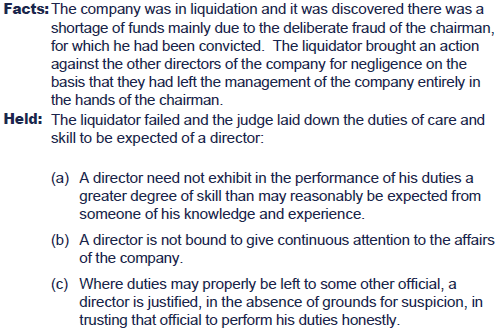
The low level of care shown in Re City Equitable Fire Insurance Co (1925) was raised in:
Dorchester Finance Co Ltd v Stebbing (1989)
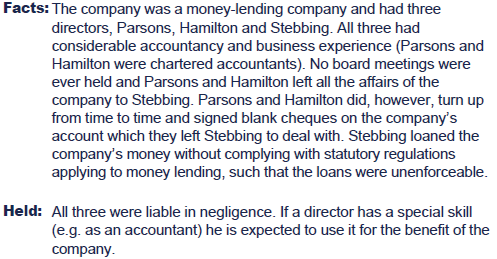
Duty to avoid conflicts of interest: s175
A director must avoid any situation which places him in directconflict with the interests of the company or the performance of anyother duty.
IDC v Cooley (1972)
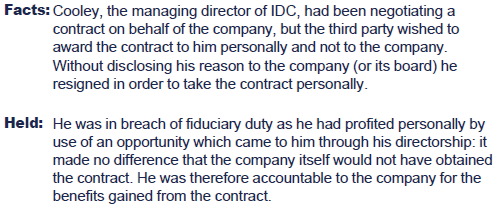
The IDC case illustrates that an individual may still be subject to the duties even after he ceases to be a director.
The accountability arises from the mere fact of having made a profit, it is not a question of loss to the company.
Regal (Hastings) Ltd v Gulliver (1942)
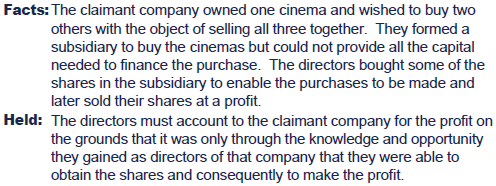
Duty not to accept benefits from third parties: s176
A director must not accept any benefit from a third party whicharises by reason of him being a director or performing/not performing anact as a director, unless acceptance cannot reasonably be regarded aslikely to give rise to a conflict of interest.
Boston Deep Sea Fishing & Ice Co v Ansell (1888)

Duty to declare interest in proposed transaction or arrangement: s177
A director is required to declare the nature and extent of anyinterest, either direct or indirect through a connected person, thatthey have in relation to a proposed transaction or arrangement with thecompany. Even if the director is not a party to a transaction, the dutymay apply if they are aware or ought reasonably to have been aware ofthe interest.
This declaration can be made in writing, at a board meeting or by a general notice that he has an interest in a third party.
Aberdeen Railway v Blakie (1854)

Breach of directors' duties
Directors owe their duties to the company as a whole, not to individual members.
Percival v Wright (1902)

Breach of duty may carry the following consequences:
- The director may be required to make good any loss suffered by the company.
- Contracts entered into between the company and the director may be rendered voidable.
- Any property taken by the director from the company can be recovered from him if still in his possession.
- Property may be recovered directly from a third party, unless that third party acquired it for value and in good faith.
- An injunction may be an appropriate remedy where the breach has not yet occurred.
S232 CA06 provides that any provision to exempt a director from orindemnify him against any liability for breach of duty or negligence isvoid.
S239 CA06 states that the company can ratify a breach of duty by passing an ordinary resolution.

 Test your understanding 2
Test your understanding 2
Jack has acted in breach of his duty to disclose his interest in a contract as a director of JK Ltd.
Which one of the following is correct?
AThe breach cannot be ratified by the shareholders.
BThe breach may be ratified by a written or ordinary resolution.
CThe breach may be ratified by a provision in the company’s articles.
DThe breach may be ratified by a resolution of the board of directors

4 Powers
The division of power within a company
The legal theory is that all decisions about the running of thecompany's business should be taken by the members in general meeting.However, the members usually delegate the power to manage the businessto the directors and they exercise all the powers of the company on aday-to-day basis.
Directors are required to exercise their powers in accordance withthe company's constitution. This requirement caused problems prior tothe Companies Act 2006 as companies normally had very narrow objects,which had the effect of severely restricting the directors' powers.Companies now have unrestricted objects, unless the articlesspecifically restrict them.
Note that the power to manage the business of the company is givento the board as a whole, not to the individual directors. Where acompany's articles delegate the management of the company's business tothe board, the members have no right to interfere in decisions made bythe board. Directors are not agents of the members and are not subjectto their instruction as to how to act.
In Shaw v John Shaw (1935) it was held that it was for theboard to decide whether or not the company should commence litigationand therefore an ordinary resolution instructing the board todiscontinue litigation had no legal effect.
There are some restrictions which mean that power is placed in the hands of the members rather than the directors:
- some actions require a special resolution
- a director can be removed at any time by an ordinary resolution of the members and they may see fit to exercise this right should their views be ignored
- the members can alter the articles by passing a special resolution. This power could therefore be used to restrict the directors' powers.
The control of directors
Although the directors manage the company on a day-to-day basis, acompany is ultimately controlled by its members. Most decisions require amajority of over 50% (although some require 75%) therefore shareholderswho are in the minority may find that their wishes are ignored.
Members can exercise their votes in their own interests. They arenot required to act for the benefit of the company. Minorityshareholders who are unhappy with a decision have the followingremedies:
Statutory control over directors
Certain matters require the approval of the members in a general meeting in order to be valid.
Directors' service contracts: s188 CA06
Directors' service contracts lasting more than two years must be approved by the members.
Substantial property transactions: s190 CA06
A substantial property transaction occurs where a director acquiresfrom the company (or vice versa) a substantial non-cash asset.
An asset is 'substantial' if its value either exceeds £100,000 orexceeds 10% of the company's asset value and is more than £5,000.
Failure to obtain the members' approval results in the following consequences:
- the transaction is voidable by the company, unless the members give approval within a reasonable period
- the director is liable to account to the company for any gain or indemnify it against any loss.
Loans to directors: s197 CA06
Any loans given to directors, or guarantees provided as security for loans provided to directors, must be approved by members.
Non-contractual payments to directors: s217 CA06
Any non-contractual payments to directors for loss of office must be approved by the members.
Authority of directors
Individual directors cannot bind the company without being givenauthority to do so. There are three ways in which this authority may begiven:

Transactions beyond the board's powers
S40 CA06 states that the power of the directors to bind thecompany, or to authorise another to bind the company, will not belimited by anything in the company's constitution, provided the other party is acting in good faith.
S40 goes on to state that even where there is actual knowledgeof the lack of authority this is not enough to count as lack of goodfaith so, on the face of it, any contract entered into by the board of acompany will be binding.
Where, however, the third party to the transaction is also adirector of the company or a person associated with a director, thetransaction becomes voidable at the company's instance: s41 CA06.Moreover, the third party director or associate, and any director whoauthorised the transaction, is then liable to compensate thecompany for any profit made or to indemnify the company for any loss ordamage arising, whether the company chooses to avoid the contract ornot.
Chapter summary
Test your understanding answers

 Test your understanding 1
Test your understanding 1
| B | The removal of a director requires an ordinary resolution with special notice. |


 Test your understanding 2
Test your understanding 2
| B | S239 CA06 states that where an interest has not been disclosed, the action can be ratified by passing an ordinary resolution. |

|
Created at 5/24/2012 2:49 PM by System Account
(GMT) Greenwich Mean Time : Dublin, Edinburgh, Lisbon, London
|
Last modified at 5/25/2012 12:54 PM by System Account
(GMT) Greenwich Mean Time : Dublin, Edinburgh, Lisbon, London
|
|
|
|
 |
Rating
:
|
 Ratings & Comments
(Click the stars to rate the page) Ratings & Comments
(Click the stars to rate the page)
|
 |
Tags:
|
|
|
|
|